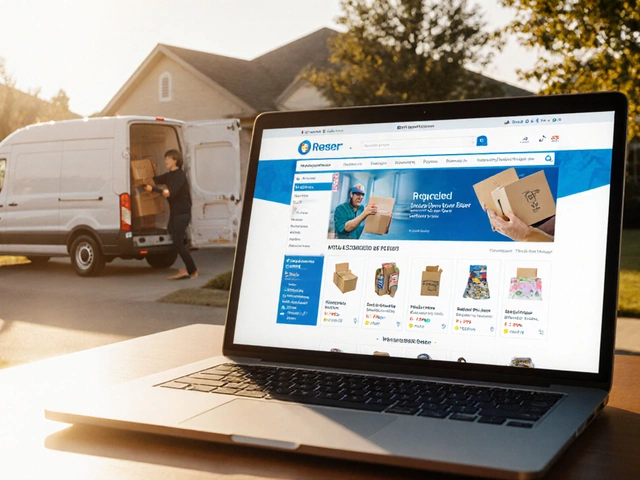Starting your own logistics company can be an exciting venture with great potential for growth. This industry plays a crucial role in connecting businesses and customers, making it a significant driver of the economy. Yet, setting up a logistics business demands more than just desire. It requires careful planning and a thorough understanding of the supply chain dynamics.
Whether you're aiming to manage a fleet of delivery vehicles or provide sophisticated supply chain solutions, getting started involves a number of important steps. From research and planning to setting up operations and leveraging modern technology, each step is vital for ensuring your company’s success. Let’s delve into the intricacies of establishing a logistics business with practical insights and strategies for achieving success.
Research and Planning
Embarking on the journey of starting a logistics company begins with thorough research and extensive planning. This is the foundational step in which you lay the groundwork for your future success in the industry. Research involves understanding the nuances of the supply chain, identifying your potential niche within the market, and analyzing the competition. Are there specific areas where you think you can provide better service or value? What are the dominant trends in logistics that might offer opportunities to tap into? These questions are important as they align your business objectives with market needs.
Your planning should extend beyond just the broader strokes and dive into the minutiae of operation. One should consider the logistical implications of the intended service area, be it local, national, or international. It's crucial to map out the strategies you will use to differentiate your offerings from established players in the field. A comprehensive business plan serves as a roadmap, with detailed financial projections, marketing strategies, and operational outlines crucial to securing potential investors' trust. Utilizing tools like SWOT analysis—identifying strengths, weaknesses, opportunities, and threats—can give a more structured form to your ideas. A successful plan also includes a keen understanding of regulations and compliance protocols specific to logistics so you can avoid future legal headaches.
Understanding the Market
You'll need to get deep into market analysis to succeed. Study what your competitors are doing, and find the areas where you can excel. Look into which sectors are experiencing growth, such as e-commerce or healthcare, and consider adjusting your business focus accordingly. A report by the Council of Supply Chain Management Professionals states that U.S. business logistics costs reached over a trillion dollars, indicating vast opportunities for new entrants.
"In logistics, there's always room for new players who can think differently and bring fresh solutions to age-old problems," says John Doe, CEO of Logistics Innovations.This insight illustrates the breadth of opportunity available for new ideas in the field.
The financial aspect cannot be ignored. It's important to have a firm grasp of your startup and operating costs. These might include fleet acquisition, staffing costs, licensing and permits, and insurance. It's advisable to analyze and calculate your pricing strategy to ensure profitability and competitiveness. A simple table illustrating cost breakdown can serve as a useful internal tool during this phase:
| Expense Category | Estimated Cost |
|---|---|
| Fleet Acquisition | $300,000 |
| Staffing | $100,000 |
| Licensing & Permits | $15,000 |
| Insurance | $20,000 |
Once you've achieved a deep understanding of the market landscape, you can develop targeted strategies that will guide everything from initial startup to long-term operational planning. The thought here is simple—you cannot over-prepare when stepping into such a competitive field.Transportation logistics is an evolving field, and staying informed and flexible in planning will be key to success.

Setting Up Operations
Getting your logistics company off the ground requires a strategic approach to setting up operations. Your operational framework serves as the backbone of your entire business. Crucial to this is defining the scope and nature of the logistics services you intend to offer. Whether your focus is on freight transportation, warehousing, or comprehensive supply chain management, understanding this foundational aspect is key to structuring your operations effectively.
One starting point is to establish a base of operations: a physical location that will serve as your command center. This could be an office, a warehouse, or a logistics hub, depending on the scale of your proposed services. Choosing the right location is significant as it impacts operational efficiency and cost. Remember that proximity to clients and transport hubs often enhances service delivery and reduces costs. In fact, a report by Supply Chain Dive highlighted how a strategic location reduced delivery times by up to 30%, underlining its influence on operational success.
Equipping your logistics hub with the necessary tools and resources is the next vital step. This might involve investing in transportation vehicles, storage facilities, specialized equipment, and software for fleet management. Modern logistics companies leverage technology extensively to streamline operations and increase transparency. For instance, implementing a robust transportation management system (TMS) can help in tracking vehicle routes, maintaining schedules, and optimizing deliveries, which is a cornerstone for modern transportation.
Hiring a well-rounded team is essential. You need professionals with expertise in logistics, technology, finance, and customer service. A competent workforce can solve problems in real-time, ensuring that the supply chain runs like a well-oiled machine. As Richard Branson once said,
"Clients do not come first. Employees come first. If you take care of your employees, they will take care of the clients."This statement resonates profoundly in logistics, where employee empowerment can directly translate to customer satisfaction.
Systematic processes form the bedrock of any logistics company. Developing clear, repeatable processes for handling goods, managing inventory, and interacting with customers is crucial. Documenting these ensures consistency and helps mitigate errors. Establishing key performance indicators (KPIs) allows you to measure operational performance, providing insights into areas needing improvement.
The legal framework cannot be overlooked. Acquaint yourself with the local regulations governing logistics and supply chain services in your area. Acquire necessary licenses and permits to operate legally, ensuring your company complies with all legal requirements. Adhering to legal and safety standards not only builds trust with clients but also protects your business from potential legal issues.

Technology and Tools
Diving into the world of logistics demands more than a solid plan and the enthusiasm to move goods. Today, technology and tools are the backbone of efficient logistics operations. Logistics companies have embraced various advancements to stay ahead in the competitive market. For instance, the implementation of transportation management systems (TMS) has revolutionized how logistics operators manage their supply chains. These systems help in planning, executing, and optimizing the physical movement of goods. What seemed like a luxury is now a necessity for seamless operations.
The importance of real-time data cannot be overstated when it comes to logistics. Platforms that provide live tracking capabilities have become indispensable. Such technologies enable logistics companies to monitor their fleets, manage fuel consumption, and predict maintenance needs. Companies have reported significant returns on their investment in tracking technology, citing reduced fuel costs and improved delivery times. As a result, the integration of Internet of Things (IoT) in logistics is skyrocketing. Transportation companies harness IoT to connect vehicles, wearables, and other equipment, leading to better operational efficiency.
Warehouse management is another arena where technology makes its mark. The introduction of automated systems, like pick-to-light and automated guided vehicles, has transformed warehouse operations. These tools not only speed up sorting and order fulfillment but also minimize human error. A report from Robotics Business Review noted that warehouses utilizing automation see immediate improvements in productivity and accuracy. Investing in these technologies is no longer a choice but a pathway to competitiveness.
Software Solutions: The Game Changers
Several software solutions tailored for the logistics sector have emerged, offering comprehensive packages that cover everything from order processing to customer interactions. Enterprise Resource Planning (ERP) systems have proven to be game changers, amalgamating various functions under one platform. These systems streamline processes by sharing data across departments, ensuring that information is accurate and easily accessible. This kind of integration facilitates better decision-making, enhancing the overall supply chain efficiency.
"The greatest innovation in logistics today is the real-time data accessibility that technology provides," said Mark Altman, a renowned logistics expert.
The cloud-based solutions are also gaining traction, allowing logistics companies to access data from anywhere, at any time. This flexibility is particularly valuable for remote teams and international operations. By incorporating cloud-based systems, logistics companies gain an edge in managing their operations more robustly and with increased agility. As such, investing in these tools represents a commitment to future-proofing businesses against rapid market changes.

Marketing and Growth
In the bustling landscape of logistics businesses, mastering the art of marketing is crucial to ensuring sustainable growth. Unlike other industries, logistics relies heavily on building and maintaining relationships with key stakeholders, including manufacturers, distributors, and consumers. The goal is to establish a strong market presence that not only attracts new clients but also retains them. To do this, it’s not just about making a sale—it’s about long-term commitment. Begin by identifying your target audience. Thoroughly understanding the needs and pain points of potential clients can guide your marketing strategy. Are you focused on small businesses looking for last-mile delivery solutions, or larger corporations needing complex supply chain management? Tailor your messaging to speak directly to these audiences.
Utilizing digital marketing platforms is essential in today’s interconnected world. Establish a robust online presence through a professional website that communicates your brand's value proposition. Use SEO techniques to optimize for visibility in search engines—integrate keywords like logistics, transportation, and supply chain within your content. Social media channels can boost engagement and drive traffic to your site. Regularly posting insightful content not only helps establish authority but keeps your audience engaged. Leverage platforms like LinkedIn to connect with industry professionals and potential clients. Networking remains a fundamental component of the logistics industry.
Don't underestimate the power of word-of-mouth endorsements and referrals. Happy customers can become your best marketers, so focusing on customer satisfaction always pays off. Offering exceptional service can lead to organic growth through recommendations. It's beneficial to create a referral program that rewards customers for bringing in new business. This can steadily increase your client base and improve brand loyalty.
To scale effectively, consider partnerships or collaborations with other companies. Building alliances can expand your reach without the expense of branching out alone. For instance, partnering with software companies that provide management solutions can add value to your service offerings.
"As Jim Tompkins, a veteran in supply chain consulting, suggests, ‘To thrive in logistics, the ability to create strategic partnerships is invaluable.’Exploring additional service lines like warehousing and inventory management could also diversify your business model, providing more comprehensive solutions that attract a wider slate of clients.
Investing in your company’s growth requires a smart approach to technology and infrastructure. Evaluate the latest advancements in logistics tech—such as route optimization software and real-time tracking tools—that can enhance your service delivery. This investment can lead to better resource management and cost reductions, which ultimately translates into competitive pricing for your clients. Consider also how automation can streamline your operations, reduce human error, and increase overall efficiency. Data-driven decision-making should be at the core of your growth strategy, offering insights that drive improvements.
Finally, don’t shy away from using customer feedback as a growth tool. Conduct regular surveys to gauge satisfaction, and be ready to pivot if certain aspects of your service aren’t meeting expectations. Understanding and adapting to your customer’s needs keeps your services relevant and innovative. By continuously refining your marketing strategies and identifying growth opportunities, your logistics business can secure its place in this vital industry.





